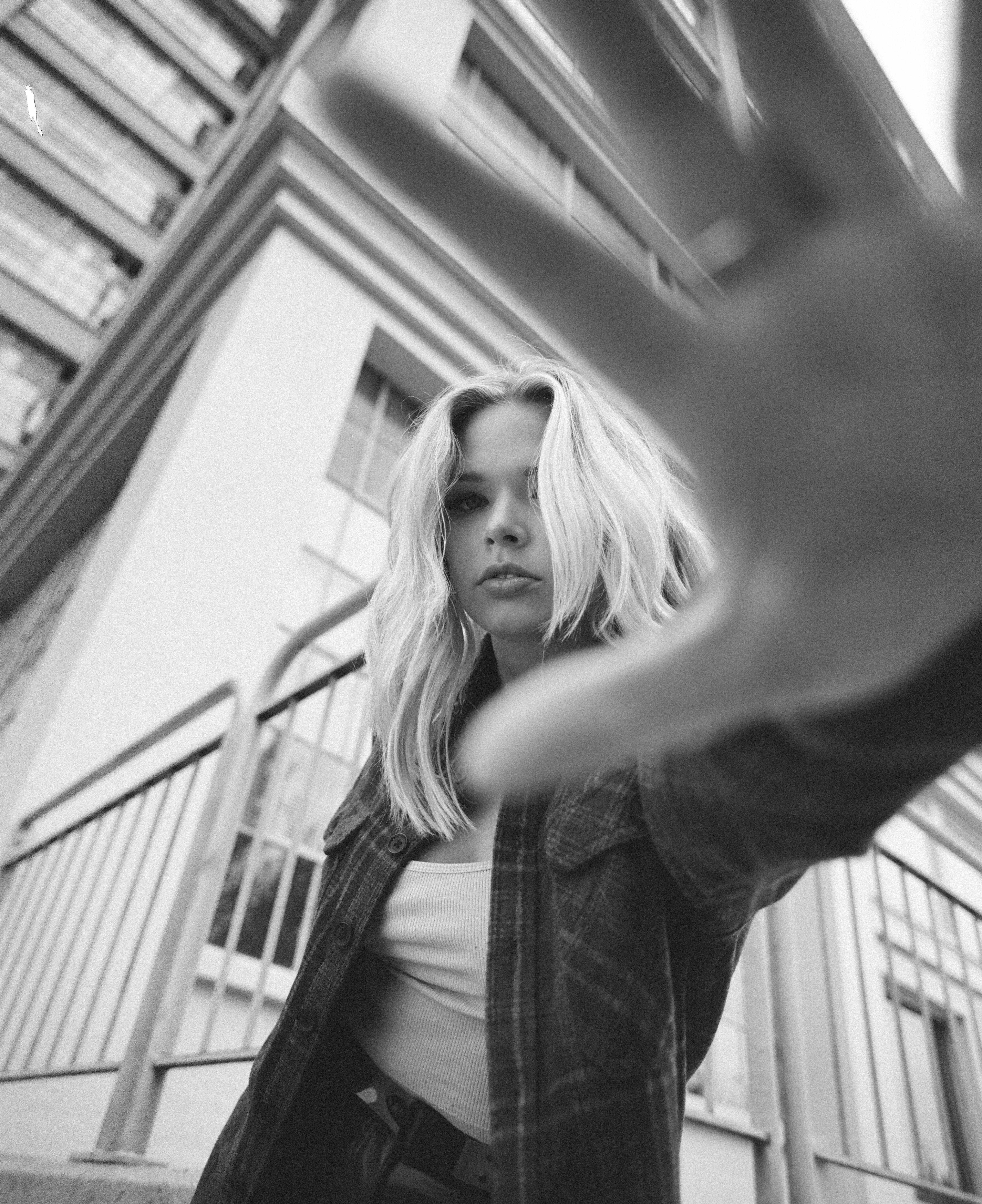If you ask around, veteran DJs and promoters in Portland’s hip-hop community are quick to name the local rapper they think is on the verge of exploding onto the national stage: Sina Wynne Holwerda. But she just goes by Wynne.
It’s OK if you’ve missed her ascent. The 24-year-old emcee’s rise has been more of a steady climb than a moonshot.
The musician has maintained a low-key presence in Northwest hip-hop for over a decade. Early on, she went from being covered in local media as a childhood novelty to a mildly controversial oddity whom Willamette Week once accurately (and snarkily) described “as a babyface blonde girl from a wealthy Portland suburb trying to forge a career in hip-hop.”
But in recent years, Wynne has overcome that skepticism and cultivated serious attention from fans, both local and well beyond Portland, who are impressed by her electrifying live performances and viral online presence. She’s also put in the work, honing her vocal skills at hip-hop showcases while listening attentively and learning from a long list of mentors and peers who sing her praises.
And now, in the wake of a critically acclaimed 2019 mixtape called “If I May...”, she’s arguably the city’s next big musical export. In fact, that may have already happened.

"DO MY OWN STUNTS" EP by Wynne and Christo
Courtesy of the artist
This week, Wynne released an ambitious six-song EP called “DO MY OWN STUNTS” via Portland label EYRST Records. It’s a collaboration with beatmaker and producer Christo, whose unique sound and top-tier work with superstar rapper J. Cole’s label Dreamville Records has made him one of the most sought-after music commodities.
Wynne joined OPB to chat about that new release as well as the craft and technique behind her rapping. Listen to the conversation above or read the interview below.
Jerad Walker: I think the first time I heard your music was maybe five years ago, you were the subject of a Willamette Week article.
Wynne: Yeah. [laughter]
JW: It had the title “Is Portland’s Next Viral Rap Star A Baby Faced Blonde Girl From Lake Oswego?”
SWH: Yes, what a headline! [laughter]
JW: It’s all true. It was an accurate headline.
SWH: Absolutely.
JW: It was also a glowing review, but I recall there being a fair amount of backlash online and on social media.
SWH: For sure.
JW: So when people see you and you don’t meet the expectations of what they think a hip-hop artist should be, how do you handle that skepticism?
SWH: I don’t know that there’s really something for me to handle. I totally understand everybody’s hesitations and I don’t take any of it personally. I just kind of get it and all I can control is myself and what I do it for and the music I make. Anyone else’s perception of me is totally up to them and if they want to express that to me, then go for it. Otherwise, I just mind my business and do what I do.
JW: I’ve worked on a couple of stories about Portland’s hip hop scene in the last year, and every time I’ve spoken to insiders and more established promoters and DJs, your name comes up. People compliment your talent. So you’ve obviously won people over on that front, but [Black artists have also told me they also] appreciate that you’re an ally. What does that mean to you?
SWH: I think it just means shutting up and listening and doing my part to support wherever I can, whatever that means to whoever is asking for the support. Other than that, just letting other people share their stories. Yeah, that’s really it— it’s just shutting up and listening.
JW: The first thing that people notice when they hear you perform is your vocal delivery. Your flow is incredibly polished, and it has this other hard-hitting gear that you slip into. It sounds effortless, but I know it can’t be. How have you cultivated that?
SWH: Honestly, my voice was something I was really uncomfortable with really up until like the last year because I grew up and most of my idols were men, male rappers. And so I was always trying to make my voice lower and trying to be more aggressive with it. It wasn’t until recently that I started to embrace like, ‘Okay, I’m just going to have a high voice in that that’s okay because I’m a girl and this is this is my voice.’
I listened to a lot of cyphers and just emcees whose main focus is delivery and coming across with power. I practiced along with a lot of rappers who did that — just kind of in the underground. So just years of practice and I did a lot of rehearsing verses of mine at double time to increase my enunciation and my delivery. I’m glad that comes through. Thank you.
JW: Cyphers are kind of like a freestyle jam. Can you explain what happens at an event like that?
SWH: There will be a mic set up on the front of the stage and they’re usually organized. Sometimes they’re not, sometimes it’s more just like whoever wants to come up and hop on the mic can. But a lot of the ones I did were organized. It would be me and three or four other emcees and we’d each come prepared with anywhere from 16 to 32 bars or whatever. There will be an instrumental they put on [the PA] and when it’s your turn you just walk up to the mic and do your verse and then the next person follows you. It’s just a way for emcees to trade bars and flex their skill.
JW: You’ve also been really open about sharing your freestyle work online with fans and random listeners. You’ve gone viral a few times, including a couple [of incidents where a rumor started] that you’re Eminem’s daughter. I think buried in there is a real compliment.
SWH: Yeah, I think so. Somewhere in there, for sure. [laughter]
JW: The new EP “DO MY OWN STUNTS” is a collaboration with the producer Christo who’s also been an in-house producer for rapper J. Cole’s record label Dreamville. Because of that association, he’s worked with some of the biggest names in hip hop. How did you sync up with him?
SWH: So Christo is someone I connected with I think in early 2019… I just love everything he’s doing. I think he’s super innovative. He’s got his own unique sound which is pretty rare these days. He’s willing to take risks. He’s willing to do just whatever it takes to make the record dope. So I was excited to get a full project with him.
JW: [His production] almost reminds me of — I grew up in the Deep South and it kind of reminds me of old-school booty bass stuff from the 90s. The 808 drum machine is to hip-hop what the guitar is to rock. It’s everywhere. So it’s rare that you hear something so distinct. But he’s got this bass sound that really rattles your cage.
SWH: Exactly. One of his monikers is “Bounceman” because his 808s and his drum bounce are just crazy. It’s very unique to him.
JW: Wynne can you tell me about the history behind the song “Mary’s Lambo”? That’s an older, previously unreleased song, correct?
SWH: Yeah, so “Mary’s” is actually a funny story. It’s the first song Christo and I made together [several years ago]. I got hit up because the movie Charlie’s Angels was being made and they needed a high-speed rap song for a battle [scene]. And so my publishing hit me up the day of and said, ‘Hey, we need you to turn around a song.’ So I made this super quick and sent it back to them. It didn’t get picked, which was kind of a blessing in disguise because I then got to live with the record. My [recording] engineer Itay [Lerner] and I ended up adding those strings and I rewrote the hook and it kind of came together at the right time. So that’s a special one for us, for sure.
JW: The song “Carrot Cake” was one of the first ones you collaborated with Christo on [in the sessions that would become “DO MY OWN STUNTS].
SWH: Yeah, I heard that beat and immediately came up with that rhyme scheme in the hook and just tucked it in my back pocket... Once we made it, I was like “This guy, he’s unique, he’s special.” He’s got unique ways of flipping samples and creating sounds and that’s what excited me and really made me want to do a whole project with him.
JW: What’s unique about the beat on “Carrot Cake” that you love?
SWH: So it’s a trumpet that he’s playing. He actually played that melody and kind of re-sampled it and pitched it up. That sound of this distorted trump wasn’t something I had really heard before. And the way the 808s — you put it on in your car and they shake your body. There’s a lot of artful, controlled chaos in Christo’s production that I’m very, very drawn to.

